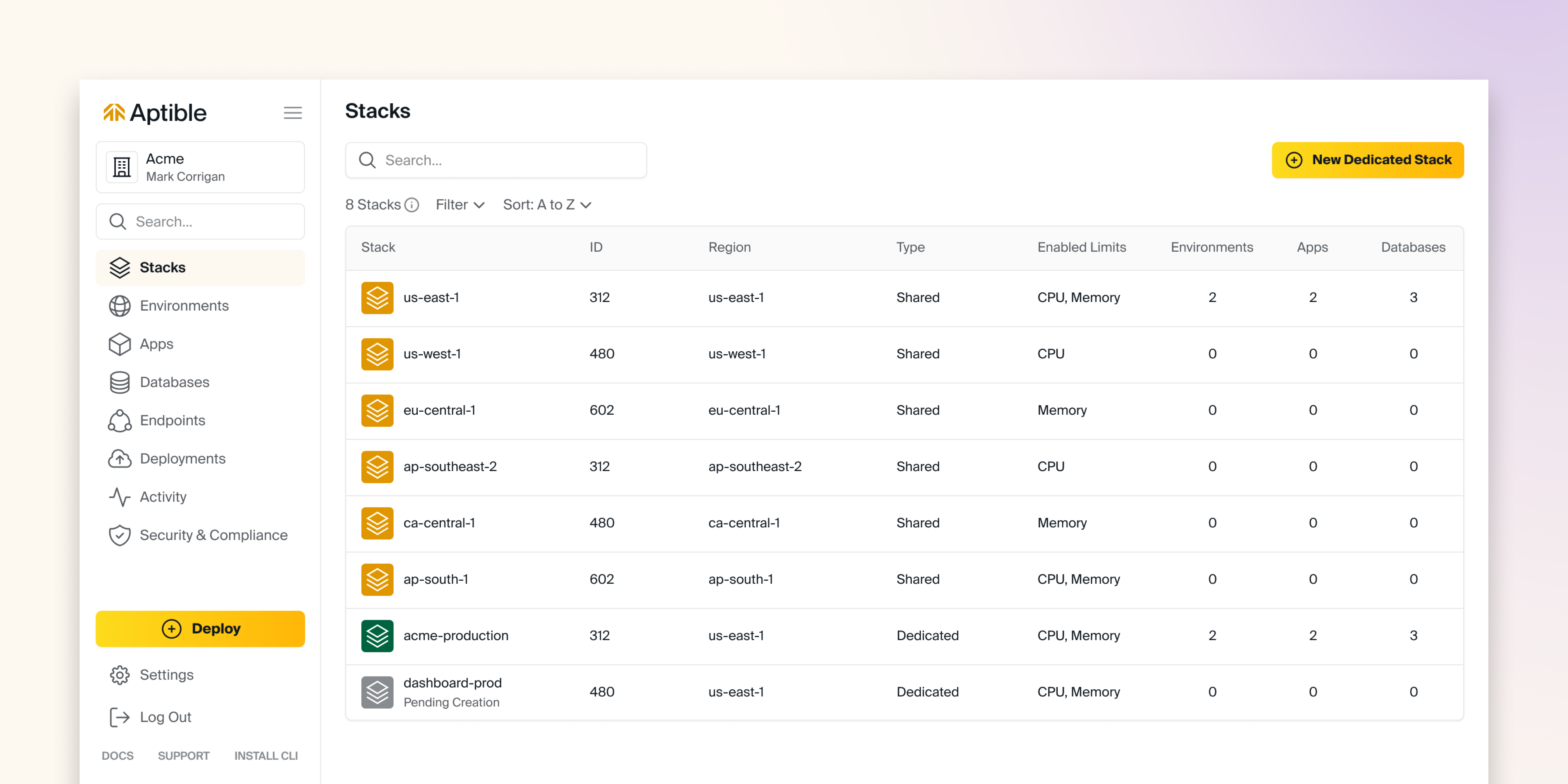Core Concepts
Reference
Troubleshooting
Feedback
Stacks

Overview
Stacks are fundamental to the network-level isolation of your resources. Each stack is hosted in a specific region and is comprised of environments.
Aptible offers two types of stacks: shared stacks (non-isolated) and dedicated stacks (isolated).
Resources in different stacks can only connect with each other with a network integration. For example: databases and internal endpoints deployed in a given stack are not accessible from apps deployed in other stacks.'
🧠 The underlying virtualized infrastructure (EC2 instances, private network, etc.), which provides network-level isolation of resources.
Shared Stacks
Stacks shared across many customers are called Shared Stacks. Use Shared Stacks for development, testing, and staging Environments.
By default, all organizations have access to shared stacks in 6 popular regions.
Note: you can not host sensitive or regulated data with shared stacks.
Dedicated Stacks
🏳️ Dedicated Stacks are only available on the Growth, Scale and Enterprise plans.
Dedicated stacks are built for production environments, are dedicated to a single customer, and provide four significant benefits:
- Tenancy - Dedicated stacks are isolated from other Aptible customers, and you can also use multiple Dedicated Stacks to architect the isolation you require within your organization.
- Availability - Aptible's Service Level Agreement applies only to Environments hosted on a Dedicated stack.
- Regulatory - Aptible will sign a HIPAA Business Associate Agreement (BAA) to cover information processing in Environments hosted on a Dedicated stack.
- Connectivity - Integrations, such as VPN and VPC Peering connections, are available only to Dedicated stacks.
- Security - Dedicated stacks automatically come with a suite of security features, including encryption, DDoS protection, host hardening, intrusion detection, and vulnerability scanning — alleviating the need to worry about security best practices.
Supported Regions
Aptible deploys Stacks in the following Regions:
- us-east-1 / US East (N. Virginia): Available on Dedicated and Shared Stacks
- us-east-2 / US East (Ohio): Available on Dedicated Stacks only
- us-west-1 / US West (N. California): Available on Dedicated and Shared Stacks
- us-west-2 / US West (Oregon): Available on Dedicated Stacks only
- eu-central-1 / Europe (Frankfurt): Available on Dedicated and Shared Stacks
- sa-east-1 / South America (São Paulo): Available on Dedicated Stacks only
- eu-west-1 / Europe (Ireland): Available on Dedicated Stacks only
- eu-west-2 / Europe (London): Available on Dedicated Stacks only
- eu-west-3 / Europe (Paris): Available on Dedicated Stacks only
- ca-central-1 / Canada (Central): Available on Dedicated and Shared Stacks
- ap-south-1 / Asia Pacific (Mumbai): Available on Dedicated and Shared Stacks
- ap-southeast-2 / Asia Pacific (Sydney): Available on Dedicated and Shared Stacks
- ap-northeast-1 / Asia Pacific (Tokyo): Available on Dedicated Stacks only
- ap-northeast-2 / Asia Pacific (Seoul): Available on Dedicated Stacks only
- ap-southeast-1 / Asia Pacific (Singapore): Available on Dedicated Stacks only
📘 A Stack's Region will affect the latency of customer connections based on proximity. For VPC Peering, deploy the Aptible Stack in the same region as the AWS VPC for both latency and DNS concerns.